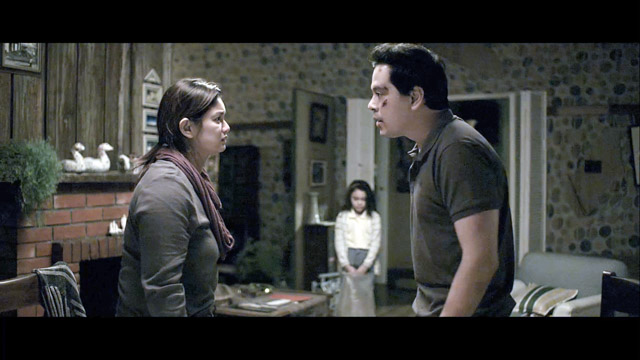
MANILA, Philippines – Dan Villegas’ Walang Forever could have been just another oddball romance that capitalizes on heartbreak for entertainment had it not been for one genius move.
Everything #MMFF2015
 READ:
READ:The film opens with a televised interview of Mia (Jennylyn Mercado), a famed writer of popular romantic comedies whose works, as the interview reveals, are directly inspired by key events in her romantic relationship with ex-boyfriend, Ethan (Jericho Rosales). By integrating into its narrative the creative process of a writer of commercial romances, it elevates itself from being just a purely escapist piece of entertainment and into something else, something more valuable.
Love reboot
Written by Paul Sta Ana with Antoinette Jadaone, the film plots the rekindling of Mia and Ethan’s love story after several years of shared regret and bitterness. After several flops, Mia is struggling to finish a new screenplay despite lacking any of the inspiration that rewarded her with hits. Ethan, on the other hand, is hiding a secret that is preventing him from loving anew.
The film curiously starts out light. It uses a lot of the awkward situations between the ex-lovers for comedy. Villegas however is careful not to exploit humor, knowing fully well that the film is to take a serious turn in its middle mark. In a way, Walang Forever is more a drama that overplays levity for the sake of populist diversion.

It mostly works. Although the film has problems with consistency and pacing since it constantly shifts in tone, Villegas never really loses sight of the direction where he wants to take the film to. While it is dressed like a lot of the typical romances that depict heartaches with questionable pomp, it beats with a heart that begs for love and respect for a genre that has been unfairly judged because of its mostly capitalist intentions.
{source}<iframe width="100%" height="360" src="https://www.youtube.com/embed/ZaI9xmSgmG8" frameborder="0" allowfullscreen></iframe>{/source}
Found stories

A lot of romantic films are satisfied with just being fantasies for erstwhile delights. Walang Forever however is overtly different, justifying its existence amid its narrative’s lack of novelty. By giving a notion that assigning personal truths is essential in the process of writing fictional love stories, the film not only settles for momentary joys that are part and parcel of its genre but also serves as a defense of escapist entertainment.

It is a very spirited attempt, one that is coming from honest sentiment and affection instead of a stubbornly intellectual bid at relevance. It convinces with emotional heft, never allowing its innovation to overshadow the simple pleasures its story offers. Villegas seamlessly blends all the elements together in a package that is gratifying from start to the end.
Romantic leads
As it turns out, Walang Forever is quite a busy film. It is preoccupied with a lot of things, from telling a typical romance in an off-kilter kind of way to giving romantic films a bid at some sort of relevance in a local film culture that is obsessed with truth. It could have been a mess of a film, but Villegas was able to manage his intentions with remarkable sobriety.

It certainly helps that both Jennylyn Mercado and Jericho Rosales are charismatic and convincing leads. They have enough sensitivity and maturity to temper the comedic scenes with palpable gravitas and to elevate the dramatic scenes with surprising mirth.

The film is an ode to romantic cinema. It is quite evident that its makers are connected to the genre in a capacity that is far greater than most. Where other films build walls that separate escape from truth to benefit the sake of commerce, Villegas’ film confronts escape by tracing its source to stories found in everyone who has experienced the charms and pains of being in love. Walang Forever aches more fervently, perhaps because it earnestly reveals that elusive bridge between fantasy and reality. – Rappler.com
 Francis Joseph Cruz litigates for a living and writes about cinema for fun. The first Filipino movie he saw in the theaters was Carlo J. Caparas’ Tirad Pass. Since then, he’s been on a mission to find better memories with Philippine cinema. Profile photo by Fatcat Studios
Francis Joseph Cruz litigates for a living and writes about cinema for fun. The first Filipino movie he saw in the theaters was Carlo J. Caparas’ Tirad Pass. Since then, he’s been on a mission to find better memories with Philippine cinema. Profile photo by Fatcat Studios